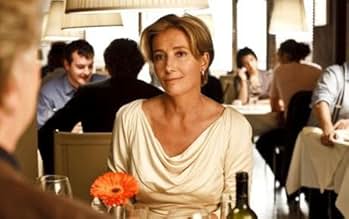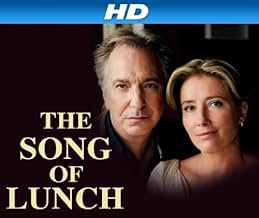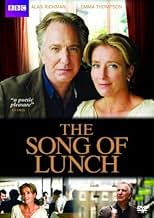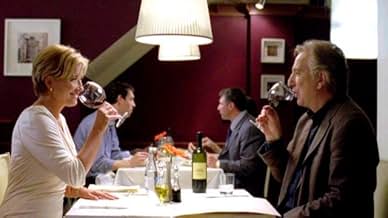The Song of Lunch
- Téléfilm
- 2010
- 50min
NOTE IMDb
7,3/10
2,7 k
MA NOTE
Ajouter une intrigue dans votre langueA London publisher recounts a lunchtime reunion with a former lover, in poetic monologue.A London publisher recounts a lunchtime reunion with a former lover, in poetic monologue.A London publisher recounts a lunchtime reunion with a former lover, in poetic monologue.
- Réalisation
- Scénario
- Casting principal
- Nommé pour 1 Primetime Emmy
- 4 nominations au total
Avis à la une
10jgw321
It is not easy to transfer poetry to film. Poetry does not tell a story like a simple novel, with the plot explained in logical prose. Instead it approaches the subject sideways; with ideas, hints and suggestions with which, by enrichment from your own experience, you arrive at a shadowy glimpse of something profound about what it is to be human.
This films achieves this in just the same way that a poem does. It is a brilliant film that I could watch over and over again, getting more from it each time. This is because the poem and film are catalysts to the beholder's share, which will be different each time I view as my mood changes, and my experiences grow.
If you don't understand poetry then this film could be rather bleak, since it dwells on ageing, lost love, mortality and similar themes. If you accept that these themes are ever present in our daily lives and we have to come to terms with them, and you understand and enjoy poetry then this is a must see film for you.
This films achieves this in just the same way that a poem does. It is a brilliant film that I could watch over and over again, getting more from it each time. This is because the poem and film are catalysts to the beholder's share, which will be different each time I view as my mood changes, and my experiences grow.
If you don't understand poetry then this film could be rather bleak, since it dwells on ageing, lost love, mortality and similar themes. If you accept that these themes are ever present in our daily lives and we have to come to terms with them, and you understand and enjoy poetry then this is a must see film for you.
This is the worst thing I've seen since My Dinner with Andre over thirty years ago. It's worse than Hook, worse than Australia, worse than the worst action movie I used to take my teenage son to see to humor him.
Is he supposed to be unlikable, or merely a bore?
What could she have possibly ever seen in him?
Who cares about his "poetry"?
The lines are unbearable, not to mention childishly vulgar, when not being unintentionally laughable.
Is this what "art" has become, ridiculously pretentious, lacking in content, causing one to itch with utter boredom?
Is he supposed to be unlikable, or merely a bore?
What could she have possibly ever seen in him?
Who cares about his "poetry"?
The lines are unbearable, not to mention childishly vulgar, when not being unintentionally laughable.
Is this what "art" has become, ridiculously pretentious, lacking in content, causing one to itch with utter boredom?
Christopher Reed's poem 'The Song of Lunch' is brought brilliantly to life here by Alan Rickman and Emma Thompson, two fine actors and, though like most actors they sometimes waste time (and make money, no doubt) in rubbish, here we see them both at the top of their games. Rickman has the harder role, since he also has to narrate the verse; but Thompson handles herself excellently opposite him, never attempting to claim a larger space than is available but filling what is there perfectly. The story is a classic male tragedy, of a drunken middle-aged man whose awareness of his own increasing unattractiveness is a self-fulfilling prophesy; but the observation and psychology are razor sharp, and the words clear and cutting. It could be thought a bold move to dramatise a poem; but with this level of quality at all levels, perhaps the success of this project was never really in doubt.
Alan Rickman plays a jaded publisher meeting a past flame (Emma Thompson) at an old haunt, now impersonally renovated. The publisher has a one-track mind and views her every move as erotic.
This is a dramatised narrative poem. I'm sceptical about modern poetry but this one's quite good. It may be familiar ground but a lot of the phrases are actually quite good: consciously poetic but a concise description. Fans of Alan Rickman might find it hard to control himself as his character is aroused by everything: a squeezed hand, a glass of wine meeting his lips, a comely waitress, even a pepper shaker. The story is told through his perspective, much of it as voice-over. The switch between voice-over and dialogue really works, creating tension and drama in what is a fairly undramatic scene. It's like a short play.
Both Rickman and Thompson speak the blank verse (with the occasional rhyme) very naturally. Their characters are intellectual people and the talk comes naturally to them, particularly Rickman's emotionally/creatively/sexually frustrated character.
It's only 50 minutes so it's worth a watch. It would have been nice if it were part of a series of poems.
This is a dramatised narrative poem. I'm sceptical about modern poetry but this one's quite good. It may be familiar ground but a lot of the phrases are actually quite good: consciously poetic but a concise description. Fans of Alan Rickman might find it hard to control himself as his character is aroused by everything: a squeezed hand, a glass of wine meeting his lips, a comely waitress, even a pepper shaker. The story is told through his perspective, much of it as voice-over. The switch between voice-over and dialogue really works, creating tension and drama in what is a fairly undramatic scene. It's like a short play.
Both Rickman and Thompson speak the blank verse (with the occasional rhyme) very naturally. Their characters are intellectual people and the talk comes naturally to them, particularly Rickman's emotionally/creatively/sexually frustrated character.
It's only 50 minutes so it's worth a watch. It would have been nice if it were part of a series of poems.
This film is not going to be for everyone. I knew that just five minutes in. But I loved it. The poem, the dialogue, the acting. Any lesser actors than these two could not have pulled it off. It is heartbreaking, because fairly early in, it becomes clear that someone has a problem and it is this issue, along with other feelings of inadequacy that is the true root of their relationship's demise. What is especially interesting is the fact that the viewer doesn't despise Rickman's character--rather, feels his humiliation and loss.
I gave the film eight stars rather than 10, because unresolved for me is the "WHY" of it. Why does he ask her to meet him for lunch to begin with? Is it to punish her? To rekindle something? Is the scene outside the apartment in Paris meant to illustrate obsession? Why does she agree to meet? Is she just being kind? If so--then why is she so cruel in her assessment of his book? The motivation/impetus for this lunch feels unclear to me.
I gave the film eight stars rather than 10, because unresolved for me is the "WHY" of it. Why does he ask her to meet him for lunch to begin with? Is it to punish her? To rekindle something? Is the scene outside the apartment in Paris meant to illustrate obsession? Why does she agree to meet? Is she just being kind? If so--then why is she so cruel in her assessment of his book? The motivation/impetus for this lunch feels unclear to me.
Le saviez-vous
- AnecdotesThe photo on the dust jacket of the lead female character's husband's book is one of Greg Wise, Dame Emma Thompson's real-life husband.
- ConnexionsFeatured in The Wright Stuff: Épisode #14.45 (2010)
Meilleurs choix
Connectez-vous pour évaluer et suivre la liste de favoris afin de recevoir des recommandations personnalisées
Détails
Contribuer à cette page
Suggérer une modification ou ajouter du contenu manquant



























